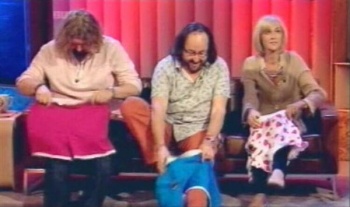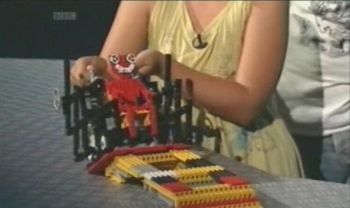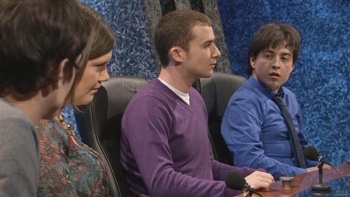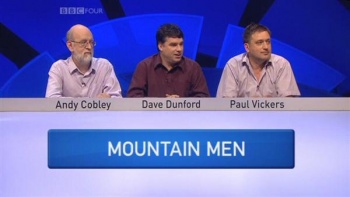Weaver's Week 2010-10-24
Last week | Weaver's Week Index | Next week
Of course it's a rectangular cuboid. There is no such thing as a non-rectangular cuboid. A cuboid is like a cube, only with rectangular sides of unequal length.
Contents |
Genius
BBC2, 10pm Mondays
It's been a little while since a game show transferred from Radio 4 to television, the last one to get a series was (er) (erm) was it Just a Minute? Anyway, Dave Gorman has brought his show of invention and humour to BBC2, and invited some celebrity guests to discuss the offered ideas.
The best ideas are always the most simple, and the format of Genius is nothing if not simple. A number of members of the audience have submitted their ideas for how to make the world a slightly better place. They're asked to briefly explain their ideas, which can be a law, a device, a gadget, whatever. The panel give comments on the concepts. After a brief discussion, and sometimes a physical demonstration, the host asks if the idea is genius, or not, and the panel votes. Ideas deemed "genius" are rewarded with a hearty round of applause, and that's it. Originally, there was a further decision to find the most genius idea of the show, and that was rewarded with an actual physical trophy, but this seems to have fallen into disuse.
The show stands or falls on two aspects: the ideas put forward to change the world, and the ability of the panellists to engage in debate. On both of these, we have concerns. The television programme moves through concepts at a cracking rate – five or six in a half-hour show isn't atypical – so if one of the ideas doesn't amount to much, we know there'll be another along in a few minutes. When we're left cold by two or three ideas in a row, we wonder about the selection process, and whether our sense of humour is on the same lines as the producers'.
We don't ask much of the panellists – they have the opportunity to engage in intellectual discourse about the merits and demerits of the proposals. They also have the opportunity to banter about these ideas, use them as an excuse to tell funny stories. When the panel is on top form, the participants will be able to do both of these at the same time, or swap between the two modes at the drop of a hat. We seem to have had the misfortune of seeing an awful lot of guests who fall between the two stools, and leave us wondering if they're a bit of a waste of space.
This column likes to try and be positive, to say what parts of the show were well-done even when the rest is a bit raw. For Genius, this is difficult because we seem to have caught some very weak episodes, hitting neither comedy nor intellectual debate. There's possibility in the show, trying to make the world a better place by laughing at its little inadequacies, but the execution just doesn't hit the spot for us. Sorry.
My Genius Idea
BBC1, 4pm Tuesdays
After the distinct disappointment with the senior version, would the junior programme be more to our liking? Johny Pitts, star of best-forgotten teatime flop Eden, is the host, and he's the typical CBBC presenter – young, dashing, and not afraid to state the obvious, as he'll mostly do during the voiceover.
The competition involves a number of young people, each of whom has come up with an invention to change the world. Here's the first point of difference: My Genius Idea is all about inventions, there's nothing to change the social order here. One by one, each young person briefly explains their concept, and how it might work. There's usually a film to help them explore the idea further.
After that, the young inventor is paired off with a more experienced technical person, who will help them to ask the questions to improve the idea. One of the ideas in the first episode was for a washing line that would signal when the clothes were just about dry. How is that going to work? Wet clothes weigh more than dry ones, but different fabrics can hold different amounts of water. So the young inventor has to soak different clothes in water, and see what's the difference.
As the half-hour show progresses, we see outline models being constructed. Another idea on the first episode was for a foldaway ramp that could be stowed beneath a wheelchair: by the end of the show, this had developed into a conceptual model made out of modelling bricks. Also around here is a further film of the competitors seeing something inventive, such as a hot air balloon – not just the hot air, but the self-healing fabric used to make the envelopes. This isn't directly related to any of the ideas under discussion, and acts as a little punctuation for viewers who might be tempted to switch over.
Back in the game, it's almost the time for the three contenders to meet judge and professional inventor Tom Lawton, and explain their ideas. He'll give them a light grilling, ask them questions about what they've done and where they'll go next, and then make a judgement. Only one of the competitors will make it through to the next round, where (we assume) they'll move to a prototype of their model.
That is the end of the programme, but not the end of the review. Genius, the programme for grown-ups, is played entirely for laughs, and we've no doubt that when it's funny, it's quite hilarious. My Genius Idea, completely by contrast, is a serious programme. Not that it's without humour, there are some lighter moments, but the aim is clearly to be educational and entertaining at the same time. Indeed, by showing examples of the design process, My Genius Idea is a junior version of Design for Life (BBC2, 2009; see the Week of 25 October 2009), without Philippe Starck being all vague about exactly what he wants.
We very much hope that My Genius Idea will show the complete path of its winning idea. Unlike Design For Life, the ending of some dreams is natural; it somehow feels more reasonable to take the best of three ideas than to discard the worst two of four.
University Challenge
Repechage 1: Cardiff v Exeter
Well, we've met the winners now. Whoever they are from the eighteen teams still in the competition. One team will be crossed off the list of possible winners each week for the rest of the year, until we reach the quarter-finals in January.
Cardiff lost to Oxford Brookes in the second match (see the Week of 18 July), and answered twelve starters in their game. Exeter appeared two weeks later (Week of 1 August), losing to Porterhouse Cambridge, and watch Tim Abbott who got eight starters last time out. One change to the teams, Adam Doggart comes in for Exeter, replacing Finn Raven.
The first question is on Royal Curmudgeon of the Week, and this week's is Philip of Greece. Exeter zag with Charles of Wales, so Cardiff take the bonuses on contemporary poets; they do less well on rebellions, and this might tell us something about the modern student mind. Exeter kick off with some carbon dating, but don't do well on Baroque composers. Of course "consider" has a root from the stars, things "siderial". It's easy when someone explains it back.
Exeter prove themselves to be good Communards, remembering those periods of Parisian history, and that Einstein devised Brownian motion. But he didn't work out the best way to generate it. Cardiff pick up the visual round, on biographies of US presidents, and lead 65-35. Cardiff go on to say "Ljubljana" in a convincing Slovene accent. We're tugging our ears in appreciation. Their bonuses are death speeches from characters written by Charlie "Fingers" Dickens, and that goes completely over their head.
Émail is the French for enamel, a joke some of us found almost funny in the previous millennium. Economic and social principles also go over Cardiff's head, suggesting that they might fall to the Peter Principle. Presidential palaces go to Exeter, though they forget that M. Popup lives in the Elyseé palace. We'll take Numberwang of the Week:
- Q: Your bonuses are on prime numbers and Prime Ministers. Tony Blair first became Prime Minister in 1997. 1997 is the 302nd prime. In each case, name the person who became or continued as PM in years represented by the following primes. Clear? Good.
Clear as mud, seen through dark spectacles, at night, in a deep mine. With the lights off. Our jaw drops further as Exeter sweep the board on this set of bonuses. Exeter also get the audio round, on NME albums of the Aughts, and that puts them ahead, 95-85. Cardiff strike back with paintings containing precisely three people, but fail to score on bonuses about films. They do only slightly better with abbreviations used by second-hand booksellers, while Exeter get contemporary historians and tie the score. X-block elements give Cardiff a starter each, and the lead. Exeter strike back with installations at the Modern Tat gallery, and take the lead by 125-120.
Mission on! Let's create a world, according to the calendar calculated by Usher. Exeter prove to know nothing about champagne, and that's surely our Hidden Student Indicator. Different definitions of "Fell" give Cardiff possession, but – for the fifth time in nine sets – the side fails to get any of the bonuses. Yes, the Second Lord of the Treasury is the Chancellor of the Exchequer, a job currently held by a third-former in on work experience.
Four minutes in the show, five minutes until Victoria starts, twenty points in the game. Exeter get the next starter, and get symbols relating to countries in South America. Cardiff have bonuses on number systems, and fail to get any questions. 25 points the gap, a couple of dropped starters, then Exeter get a starter about vitamin A. That feels like game over, even before Exeter get a perfect set of bonuses. A thousand paces? Mille? Got to be the kilometre. Exeter run away with it in, literally, the last few moments, and run out winners by 225-140.
It was not that one-sided until the very final stages, but there was always a hint that it could be. Tim Abbott got a (mere!) five starters for Exeter, the side made 20/39 bonuses with one missignal. Cardiff started strongly but after collecting seven of their first nine bonuses, added only one from the next seven sets, and 8/30 is just never going to win. Greg Rees had four starters in a losing cause.
Next match: St Andrews v St John's Cambridge
Only Connect
Series 4, heat 7: Mountain Men v In-Laws
Dreams really can come true, promises Victoria Coren. So long as your dream is being berated by a self-professed gambler and spiv. Joining us are the Mountain Men – Andy Cobley, Dave Dunford, and Paul Vickers; and the In-Laws – Jon and Penny Heal, and Jason Stevens. As the names suggest, that's a married couple and Penny's brother.
Round one is upon us, what's the connection. The In-Laws won the toss and elected to bat, and get letters and some words, so go for abbreviations in British Sign Language. It was the guess from here, but it's the wrong language – it's letters sounding like words in Spanish. Ooh, harsh starter. We claim three points on the next one, things that have certain dimensional irregularities. A point for the Mountain. In-Laws get the audio clue, and go for bands of brothers for 2 points. Which saves us hearing the latest Hanson revival, and that's got to be A Good Thing.
Oh no! The Wick of Twisted Flax is hiding some pictures – based on their limited knowledge of television camera terminology, the Mountain Men guess "dolly" and pick up three points. Saving us a picture of a dolly dealer, from the days when women were like goldfish, only on television for decoration. Sporting terms for things done in threes give one point for the in-laws, and Victoria fills with the origin of the hat-trick. Mountain Men get a list of things open only to women, and get a point. They lead 5-3, and Victoria tells us about her bathing habits.
In-Laws begin round two with "Intake", and gamble for five. "Never has a degree in engineering come in so useful". It really is the internal combustion engine cycle, so FIVE POINTS!!! Mountain Men see some pictures, they both know that it's Santa's reindeer, but neither side gets the right one. Sharps, more sharps, nothing – it's sharps in key signatures A, B, C, D major. Bonus for Mountain there.
A lovely little sneaky question for the Mountain Men, months of the year and a number. But what's the logic? Number of letters in the months gives pt 2. Who's the Home Secretary at the moment, and does she recognise her terror threat levels? The sides don't, so no points. Mountain Men close us out with a guess on some national parks, but it's not order of establishment, but size, so Cairngorms finishes us off. The sides are level, 8-8.
Mountain Men kick us off at the Wall, and start with words loaned from North American languages. There's a lot of thinking, then some jabbing to find words made up from two letters. We've no idea what the second group is they've found, but the third appears to be vines, and the last is the loan words. What's that second group? Oh, they can be poisonous. Good spot, and part of a perfect round. Ten points!
In-Laws have a lot of doing to do, and start with a set of pastries. Villains in Disney films fall out quickly, there's a set of "Old" nicknames for the Devil, and slang names for women. Blimey, that's quick! Absolutely no hesitating on the wall, they get a bit of leeway on a couple of the answers, and another perfect round. Ten points!
Which means that the game is still tied, 18-18. Looks like they'll have the full time for the Mssng Vls rnd, which begins with famous judges. Judge Judy is famous? Mountain 2-0. Phrases in lonely hearts adverts is 3-1 to the in-laws, and we're tied again. Flag-carrying airlines goes to Mountain 4-0. Job titles in the credits of Only Connect is a 2-1 win for In-Laws. Volcanoes goes to the In-laws 3-1, and Historians is theirs by 2-0.
Which means it's a very close finish. We find Mountain Men have 27 points, In-Laws have 28, and – goodness! – they'll be back in the second round.
About to be searched by engines: Alesmen v Pool Sharks
Mastermind
Heat 10
We regret to report the death of Neil Richardson, at the age of 80. He was the director of strings for the BBC Radio Orchestra, and this job led him to write a piece called "Approaching Menace" as the title music for Mastermind. Richardson went on to conduct much of the music on Four Weddings and a Funeral, before retiring to Spain.
Mark Hopes is the first contender to follow the opening music tonight, and he'll be answering questions on the Life and Films of Marlon Brando (1924-2004). Brando employed the technique of "method" acting, where the actor uses their own emotions to bring the character to life. His film career began with "A Streetcar Named Desire" (1951), and his other famous roles include "On the Waterfront" and "The Godfather". This is another round to go down in the records, quality from start to finish, ending on 15 (0).
Duncan Byrne takes the History of the Tour De France (est 1903). A publicity stunt for "L'Auto" newspaper became the best-known stage race in the world. It tours France and nearby countries for three weeks in July, and has certain points of passage almost every year: a sprint into Bordeaux, some stunning climbs in the Pyrenees, the switchback of Alpe d'Huez, and Phil Liggett's hysterical commentary on the final stage into Paris. There are a few hills on this stage, ends with a question on the last man in the Tour, and finishes with 15 (0). Clearly in the pack tonight!
Phil Smith is going to discuss the Life and Works of Ralph Reader (1903-82). A native of Crewkerne, Reader spent the 1920s working with Al Jolson, then came back to Britain. He's best known for founding the Gang Show, a series of sketches and songs put on by Scouts. The round is almost going to end as the others did, but the contender gets the last question wrong, and has had a pass. Still, 14 (1) is darned good.
Bill Cawley has chosen 20th-century American presidents. From William McKinley to William Clinton, the Americas were ruled over by a series of household names during the last century. Teddy Roosevelt gave his name to the Teddy bear, Gerald Ford to the Ford motor car, and Herbert Hoover to the Herbert. This is, perhaps, a Very Large Subject, but the contender's up to it, remembering minutiae about cabinet posts occupied by people we've never heard of, and trivia about who won which states in which year. The contender's lucky to get a question after the buzzer, and finishes on 14 (0).
Mission on! Mr. Smith kicks us off, with the origin of the word "Atlas" for a collection of maps, the language of Burma (or whatever it's calling itself this week), the football world cup, but there are errors in the round, and it begins to fall away towards the end. Still, 23 (2) is a perfectly respectable score.
Mr. Cawley is next, and remembers Goliath, Johnny Cash to get off to a good start. There are a couple of errors that visibly irritate the contender – confusing the "Postmaster General" with the "Paymaster General" is perhaps the worst – but he doesn't let this stop him. The capital of Mozambique, Dante's Divine Comedy, and the origin of the word "khaki" all add points, as the round moves to 28 (1).
Mr. Hopes kicks off with Lara Croft, and Cerberus, and guesses "Handel" when asked for a composer. Not this time, sadly. He's prepared to pass when he doesn't know an answer, but actually knows both the current President of the EU and the show that first brought Ant and Dec together. "Byker Grove" and Herman von Rumpoy in juxtaposition; where else... It's not enough to win, and the contender finishes on 24 (4).
The runners-up currently due back:
- Hamish Cameron 30 (2)
- Ann Skillen 30 (7)
- James Collenette 29 (2)
- Duncan Byrne 27 (2)
- Ian Packham 27 (4)
- Chris Harrison 26 (1)
Mr. Byrne is asked the Seven Hundred Thousand Pound question: what does an arctophile collect? Mary Swain knew it in 2003, and so does this contender. He also knows the team captains on "Shooting Stars", the MP for West Oxfordshire (some bloke called Dave Cameroon, whoever he is), and the scientific name for the clover. A long question means he doesn't get to end on the buzzer, and finishes on 27 (2).
It's enough to remove Laura Humphrys from the repechage board, and put Duncan Byrne in fourth place; it looks like 28 will be the required figure to make the semis. Bill Cawley goes through as of right, the question after the buzzer didn't alter the result at the end.
This Week And Next
We offer our condolences to the proprietor of Bother's Bar, who suffered an unexpected bereavement last week.
We hear that Channel 5 is to seek a refund for its recent Don't Stop Believing series. The channel's withholding some of the £6 million budget from producers Shine TV, on the grounds that the programme didn't pull as many viewers as C5 hoped it would. Well, if you will reschedule it from the middle of primetime to teatime, you will lose viewers. We have little sympathy for the Murdoch family, but even less for people who try to wriggle out of their obligations.
Ratings for the week to 10 October are in. To the surprise of no-one, Simon Cowell Annoys remains the most popular show, 13.15m people saw Joe McElderry's new song on Sunday night, and the Saturday night behemoth averaged 12.6m people through its thirty-nine hour duration. Strictly was seen by 9.45m, and The Apprentice opened its new campaign with 7.65m viewers. Masterchef The Professionals stirred 3.45m into watching, The Apprentice You're Fired had 2.9m turning over, and University Challenge Europe v US 2.65m. People will watch anything in that slot. Channel 4's biggest was Come Dine With Me on Wednesday teatime, 2.45m saw it.
No data for ITV-HD, which rather ruins our plan to have a separate HD section. We do know that The Apprentice on BBC-HD had 460,000 viewers, just ahead of Strictly 415,000. ITV2-HD opened this week, and its biggest show was More Cowell on Sunday, with 30,000 squinting at the picture. That's against 1,165,000 who saw the show on common-or-garden ITV2. Not the most popular show, that honour falls to Celebrity Juice with 1.25m viewers. A League of Their Own returned to The Satellite Channel, with 710,000 seeing those old jokes. Come Dine With Me on More4 is suffering of late, only 605,000 saw the Sunday repeat. There's an episode on C4 each weekday, a primetime one on Friday, and some archive shows on Saturday. Could it be that all of this is sating the audience's palates, and leaving them too stuffed to enjoy the show on Sunday?
We hear that pest control was called to the Simon Cowell Annoys house during the week, to eliminate nasty bugs and horrible slimy things. It's for this reason that the programme will be renamed A Cockroach Gives Singing Tips.
It's the fall classic this week, as Davina McCall watches millions and millions of pounds disappear from view in The Million Pound Drop Live (C4, 10pm weekdays). Only slightly lower stakes as Brain of Britain returns (Radio 4, 1.30 Monday). Food fans have Street Market Chefs (C5, 7.30 Tuesday), Instant Restaurant (BBC2, 2.15 weekdays), and The Hairy Bikers' Cook Off (BBC2, 5.15 weekdays). Hidden educational show Monte Carlo or Bust is out of place on ITV (9pm Thursday), and we're really not sure about Brainsurge (Nickelodeon, 6.30pm from Tuesday). Next week's talent times: Strictly (6.25 Saturday; Sunday's guest is Alice Cooper); Cockroach (8pm Saturday; Sunday's guest is Legs Centipede.)
To have Weaver's Week emailed to you on publication day, receive our exclusive TV roundup of the game shows in the week ahead, and chat to other ukgameshows.com readers, sign up to our Yahoo! Group.








